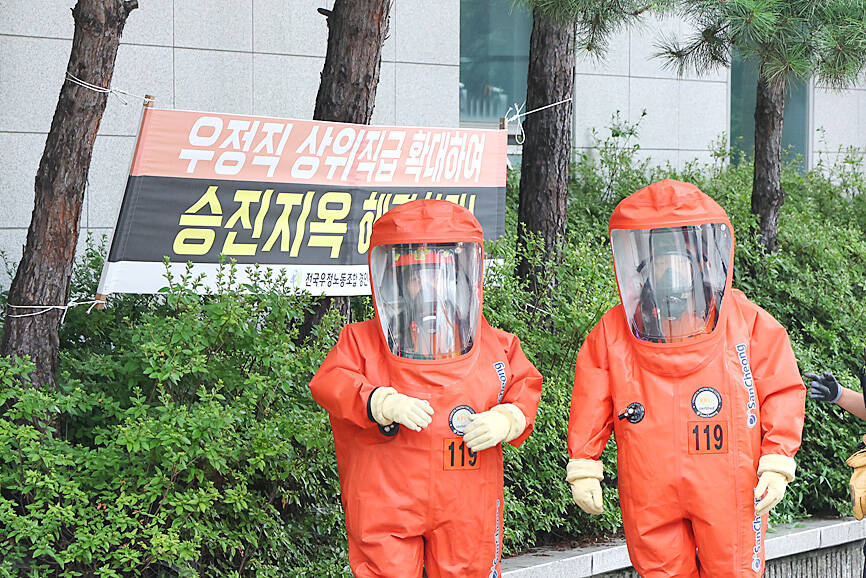Chunghwa Post yesterday announced a series of measures to prevent the delivery of dangerous items through its system.
The state-run company made the announcement after three employees of a care facility in Ulsan, South Korea, on Thursday reported that they had difficulty breathing and were taken to a hospital for treatment after opening a package that had transited through Taiwan.
The postal company traced the origin of the package and found that it was initially sent from China and transshipped to South Korea through Chunghwa Post’s delivery service.

Photo: EPA-EFE
A Criminal Investigation Bureau probe found that the package had been shipped by surface mail from China and sorted through Chunghwa Post’s freight forwarding center during a stopover in Taiwan. It was later shipped directly to South Korea by air, without passing through Taiwan’s customs.
The incident prompted Chunghwa Post to suspend delivery of packages to South Korea commissioned by the Taiwanese logistics firm that received the package from China.
Korea Post expanded its search by tracing the whereabouts of more than 2,500 packages that were sent along with the parcel.
Delivery would not to be resumed until after Korea Post completes its investigation, Chunghwa Post said.
The Taiwanese logistics firm could be fined up to NT$150,000 if it is found to have breached the terms of mail delivery contracts, the post office said, adding that it would be asked to pay additional compensation should Chunghwa Post incur additional financial losses because of the incident.
“In view of this incident, we have asked logistics firms or freight forwarders to accept only items for delivery from logistics firms and suppliers verified by cross-border e-commerce platforms. They are banned from accepting goods from individuals,” Chunghwa Post said.
To increase control over goods that are to be delivered through the mail transshipment system, the postal firm said it would add a vetting system for suspicious items, such as solid aroma compounds and liquid essences, as well as items that were frequently misrepresented on customs reports, such as lip balm and makeup cotton.
Under current regulations, eight categories of items are banned from being delivered through Chunghwa Post’s transshipment service, including sharp metals, valuables, items prohibited from importation by the destination country, live animals, obscene items, dangerous items, narcotic drugs and other prohibited items. Mail would be sent after customs X-ray the packages and confirm that they do not contain problematic content.

Three batches of banana sauce imported from the Philippines were intercepted at the border after they were found to contain the banned industrial dye Orange G, the Food and Drug Administration (FDA) said yesterday. From today through Sept. 2 next year, all seasoning sauces from the Philippines are to be subject to the FDA’s strictest border inspection, meaning 100 percent testing for illegal dyes before entry is allowed, it said in a statement. Orange G is an industrial coloring agent that is not permitted for food use in Taiwan or internationally, said Cheng Wei-chih (鄭維智), head of the FDA’s Northern Center for

LOOKING NORTH: The base would enhance the military’s awareness of activities in the Bashi Channel, which China Coast Guard ships have been frequenting, an expert said The Philippine Navy on Thursday last week inaugurated a forward operating base in the country’s northern most province of Batanes, which at 185km from Taiwan would be strategically important in a military conflict in the Taiwan Strait. The Philippine Daily Inquirer quoted Northern Luzon Command Commander Lieutenant General Fernyl Buca as saying that the base in Mahatao would bolster the country’s northern defenses and response capabilities. The base is also a response to the “irregular presence this month of armed” of China Coast Guard vessels frequenting the Bashi Channel in the Luzon Strait just south of Taiwan, the paper reported, citing a

UNDER PRESSURE: The report cited numerous events that have happened this year to show increased coercion from China, such as military drills and legal threats The Chinese Communist Party (CCP) aims to reinforce its “one China” principle and the idea that Taiwan belongs to the People’s Republic of China by hosting celebratory events this year for the 80th anniversary of the end of World War II, the “retrocession” of Taiwan and the establishment of the UN, the Mainland Affairs Council (MAC) said in its latest report to the Legislative Yuan. Taking advantage of the significant anniversaries, Chinese officials are attempting to assert China’s sovereignty over Taiwan through interviews with international news media and cross-strait exchange events, the report said. Beijing intends to reinforce its “one China” principle

A total lunar eclipse, an astronomical event often referred to as a “blood moon,” would be visible to sky watchers in Taiwan starting just before midnight on Sunday night, the Taipei Astronomical Museum said. The phenomenon is also called “blood moon” due to the reddish-orange hue it takes on as the Earth passes directly between the sun and the moon, completely blocking direct sunlight from reaching the lunar surface. The only light is refracted by the Earth’s atmosphere, and its red wavelengths are bent toward the moon, illuminating it in a dramatic crimson light. Describing the event as the most important astronomical phenomenon